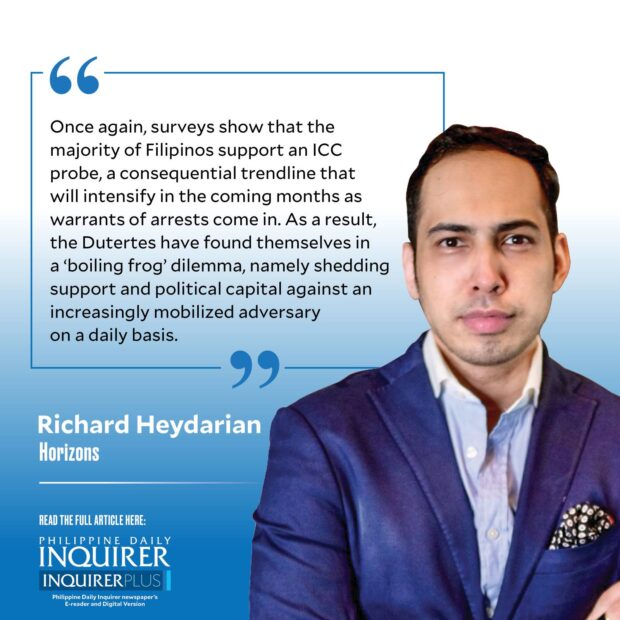Marcos in a political sweet spot

The Duterte dynasty has accomplished a historic feat: it has managed to unify much of the country—including the warring loyalist and liberal camps—against itself. Self-entitled but not superbly sophisticated, the nouveau riche dynasty has struggled to come to terms with its new political reality: namely, that it’s, at best, the “junior partner” in the Marcos administration.
Defiant yet bereft of self-reflection, the pro-Duterte camp has launched a quixotic and utterly piteous “people power” calling on the incumbent to resign. Barely halfway into his six-year term in office, the namesake son of the former Philippine dictator has found himself in a political sweet spot. President Marcos faces the enviable option of doing the right thing as well as the popular and politically beneficial one.
It’s true that the Dutertes were instrumental to Mr. Marcos’ overwhelming victory in the 2022 elections. The latter was barely second in some pre-election surveys, securing just the support of less than a fifth of total prospective voters. The withdrawal of Sara Duterte from the race and the eventual UniTeam alliance sealed the deal.
Purely built on political expediency, the Marcos-Duterte tandem was always liable to internal conflagration. What accelerated the inevitable disintegration of the dynastic confab was, ironically, the historic weakness of the opposition, which rapidly switched into hibernation mode following a remarkable display of resilience throughout the 2022 elections.
After mobilizing hundreds of thousands of Filipinos in multiple rallies, the opposition leadership almost completely abandoned the field. There was no discernible effort to organize and mobilize the millions-strong “Pink movement” into a more permanent political force, which could exert pressure on the second Marcos regime and serve as a linchpin for democratic transformation. It was precisely at this point that the country suddenly seemed less like a contested democracy and more like a one-party system, where factional politics became the defining feature of national politics.
Signs of trouble emerged early on, with the Duterte camp openly challenging Mr. Marcos’ presidential prerogatives, most notably his (correct) decision to walk back his earlier promise to hand the vital Department of National Defense to his newly crowned vice president. It didn’t take long before former president Duterte openly warned his successor that he wouldn’t hesitate to “fiscalize” the Marcos administration. The former mayor-president, who had earlier promised to “retire” from politics, effectively warned that the Dutertes could turn into a de facto opposition if they didn’t get their way.
Just over a year later, the former president declared himself as the de facto leader of the opposition by openly accusing his successor of being unfit for office (allegedly due to drug abuse), incited rebellion, and called on the armed forces to topple the regime.
The double-digit drop in Mr. Marcos’ approval ratings earlier this year, largely driven by Mindanao-based voters, is clearly a reflection of the Dutertes’ direct challenge to his presidency. Having absorbed the first blow, Mr. Marcos, who still enjoys a majority approval rating, now has the option to strike back decisively.
For all his supposed “charisma,” the visibly aging Duterte can be pinned down on two fronts. First, his alleged “gentleman’s agreement” with China is grounds for serious investigation and, down the road, potential prosecution for abuse of power and betrayal of national interest. Surveys clearly show that the vast majority of Filipinos support Mr. Marcos’ tough stance in the West Philippine Sea in a clear rebuke of Duterte’s pro-China predilections.
More importantly, Mr. Marcos has steadily indicated that his administration may eventually let the International Criminal Court (ICC) exercise its mandate: namely, to not only investigate but also potentially prosecute top Duterte administration officials for crimes against humanity. Once again, surveys show that the majority of Filipinos support an ICC probe, a consequential trendline that will intensify in the coming months as warrants of arrests come in.
As a result, the Dutertes have found themselves in a “boiling frog” dilemma, namely shedding support and political capital against an increasingly mobilized adversary on a daily basis. So far, Mr. Marcos seems focused on coup-proofing his regime and is still deterred by Sara Duterte’s high approval ratings. But it only takes one major spark for the Mexican standoff to transmogrify into a mini-civil war in Mr. Marcos’ favor.
rheydarian@inquirer.com.ph
















